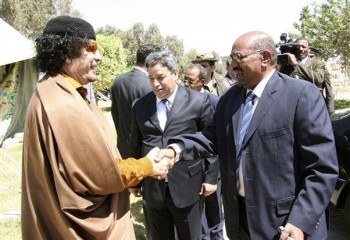Sudan’s Bashir travels to Libya instead of Ethiopia
March 26, 2009 (KHARTOUM) — The Sudanese president Omer Hassan al-Bashir made a brief stop in the Libyan city of Sirte on Thursday for talks with leader Muammar Gaddafi.

It was reported earlier that Bashir was on his way to the Ethiopian capital but he appeared in Tripoli instead. It was not clear if it was a change of plans or a cover-up for security reasons.
The official Libyan news agency (JANA) said that Bashir thanked Gaddafi “for his solid pro-Sudan positions in regional and international forums, a position that reflects the depth of the relationship between the two brother countries”.
Both sides issued a communiqué agreeing to support the peace talks in the Arab Gulf state of Qatar between Khartoum and Darfur Justice and Equality Movement (JEM).
The two leaders also discussed the humanitarian situation in Darfur and Sudan’s tense relations with Chad.
They agreed to focus on a “social solution” for Darfur and work towards a free and fair referendum for its population, JANA added.
Libyan leader has accused Israel last month of standing behind the conflict in the Western region of Darfur.
“It will be no surprise to anyone when we say that we have found unequivocal proof that the Darfur crisis was fomented by foreign powers” Qadhafi said in a speech to an African conference organized by the UN Educational, Scientific and Cultural Organization (UNESCO).
“Key rebel leaders have opened offices in Tel Aviv and meet frequently with the [Israeli] army….If Tel Aviv among others is behind the events in Darfur, why then call Bashir or the Sudanese government to account” he said.
Gaddafi criticized the warrant against Bashir telling the United Nations chief Ban Ki-Moon that it constituted a “grave precedent against the independence of less powerful states, their sovereignty and their political choices”.
(ST)
